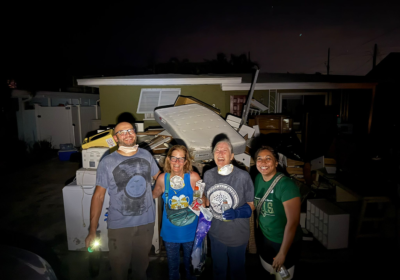USF scientists find clues to possible origin of life

SPECIAL TO THE ORACLE
The discovery of water on Mars led scientists to consider the possibilities of life on the planet. Research being conducted on USF’s campus might have located a potential source.
Recent work by Matthew Pasek, USF associate professor of geology, Maheen Gull, USF post-doctoral researcher, and their colleagues at Georgia Institute of Technology (GT) demonstrated the chemistry of life as it’s known might have originated from the meteors and meteorites that struck the early Earth.
The research work started in March of 2012 and was conducted at Pasek’s lab at the USF School of Geosciences and at GT’s School of Chemistry and Biochemistry.
In a research article published in Nature Publishing Group’s scientific reports, the researchers concluded that a mineral present in meteors called schreibersite might have provided the phosphorus essential to life.
“Our research has shown that the meteoritic mineral schreibersite … may have comprised a substantial portion of the total phosphorus inventory of the early Earth and it is quite capable of reacting with water and organic compounds to provide potentially prebiotic phosphorus compounds,” Gull said in an email with the Oracle.
The researchers were motivated to do this project because of earlier studies showing a reaction between water and schreibersite may produce phosphorus, which would later be used for early life in the form of nucleic acids such as DNA and ATP.
Prior work on this subject revealed inorganic phosphate can act as both a reactant and catalyst in biochemical reactions. Pasek and Gull believe their work not only verifies this claim, but also proves the origin of life may be extraterrestrial in nature.
The experiment involved obtaining meteorite samples from Australia and reacting them with organic molecules such as glycerol, a molecule present in cell membranes, as well as RNA and DNA in conditions that would be similar to that of the early earth.
The exact mechanism of phosphorylation is still being investigated, which also raises further questions about extraterrestrial life.
For example, NASA scientists have concluded that frozen water is present on Mars. The fact that Mars also gets hit by meteors raises the question of whether life has ever existed or currently exists on the planet.
Questions of this nature have yet to be answered, but Pasek and Gull believe their research will help future scientists in determining the origin of life on earth and possibly other planets as well.
“Other natural sources of phosphite include lightning strikes, geothermal fluids and plausibly microbial activity under extremely anaerobic condition,” Gull said in an email with the Oracle. “But no other terrestrial sources of phosphite have been identified and none could have produced the quantities of phosphite needed to be dissolved in early Earth oceans that gave rise to life.”







